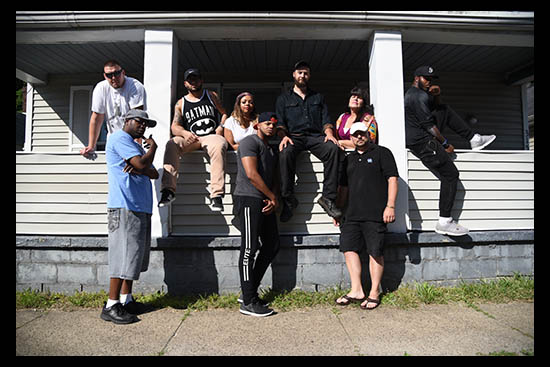Leadership and community support from a UK hip hop class
Leadership and community support from a UK hip hop class

Hip hop is not just a music style. At the University of Kentucky, it’s a tool to teach community leadership.
College of Agriculture, Food and Environment Associate Professor Bryan Hains and hip hop artist and community activist Devine Carama had been collaborating on other community projects when they decided to meld their talents for a short course in the Department of Community and Leadership Development. Lyricism and Leadership: Hip Hop and Community Change was a four-week class that examined some of the social issues that people in distressed communities deal with on a daily basis.
“Hip hop has been used as a form of instruction at universities for a long time, but I don’t know if it’s ever been used for a community voice or community activism in the way that we have,” Hains said. “This takes a college of agriculture to a whole other level of impact, as you explore the inner group dynamics of community development, things like family studies, relationships, racial divides. And it’s also environmental. It hits a lot of the content that we currently teach.”
The students produced an album of their own original work that addressed such themes as fatherhood, violence, the environment and racism. Reinforcing the notion of giving back to the community, the profits from sales of their CD benefit On the Move Art Studio, a mobile nonprofit art studio in Central Kentucky that offers free art workshops for youth in inner-city neighborhoods.
“A lot of people don’t know that the foundation of hip hop is community,” said Carama, who runs the community nonprofit, Believing in Forever. “Hip hop became that voice for people who felt they were voiceless. It was so connected to the community; that’s why a class like this makes sense.”
The class showed a diversity that the teachers said made their work particularly meaningful. There were women and men who were white, black or bi-racial, who ranged from college-aged to a grandmother in her late fifties, and who were from cities or small towns. They all weren’t fans of hip hop at the start of the class.
“It was a very eclectic group,” Hains said.
That diversity helped the students experience things through others’ eyes.
“We had to look at it from what have you experienced, versus what can be a false, stereotypical view. So in addition to writing their own words, these are their experiences that they have had associated with the concept of community struggle,” Hains said.
Carama said they pushed the students to understand the entire dynamic of a community.
“They had to sit and think and try to embody what those people are going through,” he said. “To me, that makes anybody a better leader, especially when it comes to community development or when it comes to issues that we’re voting on or making communities better.”
Lou Ann Cavenee-Ramos is a grandmother whose son was a little amazed she was taking a hip hop class. She had been exposed to hip hop when her now 31-, 32- and 33-year-old children were teenagers. She can’t say she ever grew to really like it, though.
“When it was really in its heyday, I had to listen to it (in the car). And my son just about made me sick with the bass,” she said.
Cavenee-Ramos, who adopted the stage name of Mama Lou for the album, described her career as going backwards. She was on the Prichard Committee for Academic Excellence for 13 years, doing parent and leadership trainings. Now she is back in school, getting a degree in community and leadership development. Because she tries to do things that are out of the ordinary, when she saw the flyer for the course, she decided to take it.
“I cannot sing, and I have no rhythm, so what am I doing taking a hip hop class?” she said, laughing. ”But it was three, four hours on a Tuesday night and I thought, sure, I can stay awake for that.”
The students picked the topics for their songs, and Cavenee-Ramos ended up choosing the environment, discrimination and education.
“The reason for discrimination—even though I am a white woman of the privileged class, I was married to a dark-skinned Puerto Rican and I have mixed children, and I can speak to that,” she said. “I think the songs that came out of (the class) are pretty relevant. We’re not just telling you what’s wrong with the world. I think, in the end, we opened it up for solutions. It’s authentic. It’s relevant to today.”
“There’s so much power here,” Hains said. “All of these individuals have their own initiatives on how they want to make leadership and community changes within their own institutions.”
Cavenee-Ramos said one of the take-home messages from the class was that there are different ways to be involved in leadership.
“It’s no longer the white man in the suit or the person with the money,” she said. “It can be grassroots. Get outside your box. Or as one of my friends said, don’t lead outside the box. Lead like there is no box.”
Agents of Change, Vol. 1 is for sale at The Album Record Shop, 371 S. Limestone, Lexington and online at https://believinginforever.bandcamp.com/album/agents-of-change-volume-1.
Community & Leadership Development


